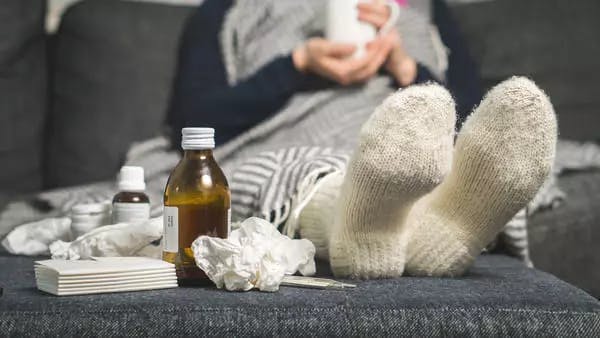10 Simple Ways to Live a Healthier Life
Contributed by Valeria Latona
Make simple changes to your lifestyle and you can get a clean bill of health from your doctor. Whether it’s changing your regimen or mentality, taking small steps can make a great impact on your health, wellness, and quality of life.

Try these do-able tips, and you'll see what a difference they make in your own life. Keep in mind: it takes 21 days to make a habit stick, so give yourself at least that long to put these healthy habits into effect.
1. Take 5 minutes to stretch every morning
Try to do this as soon as you get out of bed. (You can even do it in bed, if you want.) Hold each stretch for about 30 seconds; do not bounce up and down as you stretch as this could cause you to pull a muscle.
- Raise your hands above your head and reach.
- Reach for your toes.
- Sit on the floor in a V—and reach both hands to each one of your feet.
Why it's important: as we age, our muscles get tighter and our range of motion is minimized—and that means even the simplest day-to-day activities like getting out of bed, getting up from your office chair, or reaching for something in the cupboard can become more difficult and even cause injury.
The solution is stretching—and everyone can do it, regardless of age or flexibility. Making it part of your daily routine, like brushing your teeth, means you won't skip it.
2. Open up your blinds first thing in the morning—and even open a window, if it's not already open.
Experts say that fresh air and letting the light in helps to wake you up—and cues the brain to repress the production of melatonin, the hormone that regulates sleep.
3. Run a humidifier during the fall and winter months.
Indoor heat dries out the air inside your home and office, which can dry out your skin, your hair, and your nasal passages—encouraging colds and even the flu, according to one study published in the journal, the Proceedings of the National Academy of Sciences.[1]
The ideal humidity in the home (or office) should be between 30 and 50 percent. If you think your home’s humidity may be too high or low, you can measure this with a hygrometer or try leaving a glass with ice cubes in a room (and stay out of the room) for a few minutes. When you return, look for water droplets on the outside of the glass. If you see them, your humidity is likely fine. If your glass isn’t ‘sweating,’ then the room may be too dry.
4. Take your vitamins every day.
I see vitamins as insurance—they can help cover gaps in my diet, so I know I’m getting key nutrients my body needs to function at its best. Consider taking a multivitamin geared toward your sex: men’s and women’s bodies have different nutrient requirements, especially as we age.
For women, look for a multivitamin with calcium, iron, vitamins A, B6, B12, C, D, and E, and biotin. And for men, look for vitamins B6, B12, C, D, and E, selenium, zinc, and lycopene.
5. Add just five minutes to your workout.
We all know that exercising keeps weight down, but it also helps protect the heart, reduces our risk of diabetes, and may even help reduce the risk of cancer. Studies also show that exercising helps strengthen the immune system.
By adding just five minutes to your workout, you're strengthening your body—and improving your cardiovascular fitness (as well as burning a few more calories).
Along the same lines: if you don't exercise every day, allow yourself just five minutes of exercise in the morning and in the evening. By thinking about exercise in small increments like this—you'll be more likely to do it regularly and stick with it over the long haul.
Need some suggestions for five-minute exercises? Walk down the street or around the block, park your car further away from your office or the store, take the stairs instead of the elevator, or do crunches or push-ups while you're watching TV. Remember to also exercise your abs, hips, and lower back (a.k.a. your core) because a strong core means fewer back problems and fewer mobility issues as you get older.
6. Allow yourself one small indulgence a day.
Make it whatever you want – maybe it’s something sweet or savory. If you like hot chocolate, for example, consider this: A new study from the journal Neurology[2] shows that drinking two cups of hot chocolate a day may actually keep your brain healthy and your thinking skills sharp. That's thanks to the antioxidants in the chocolate.
It’s still important that you get all your daily servings of fruits, veggies and protein, but allowing yourself one small luxury a day—like hot chocolate—is important, because it satisfies your cravings, so you don't feel deprived (which could possibly trigger binge eating later on).
7. Shut off your smartphone—and TV and computer—at least one hour before you get into bed. (And do not fall asleep with the TV on.)
Studies show that blue light—the kind that's emitted from electronic devices—interrupts our normal sleep cycles, making it harder for us to get quality sleep.
Do your body a favor and shut off all electronics at least an hour before you go to bed, no excuses. And keep your phone out of the bedroom so incoming messages and texts don't interrupt your shut-eye. You'll be amazed at how much better you sleep when you do this!
8. Carry a water bottle with you at all times.
Keeping a water bottle with you—in the car, in your office, at the gym, wherever!—ensures that you'll drink at least the recommended daily 15.5 cups of water for men and 11.5 cups for women.[3] It also prevents you from drinking calorie-laden soda or other beverages.
If you drink coffee, limit yourself to no more than two cups per day. Try brewing a pot of green tea in the morning, ice it and fill up your water bottles with it. You can also flavor your water bottles with slices of lemon, cucumber, and even frozen berries.
9. Learn the art of meditation—and mindfulness.
Learning to focus your brain and shut out all the cacophony of life can slow down your heart rate and your breathing, which reduces stress levels. It also helps you gain perspective on your life because you’re slowing down to appreciate everything you have.
Here are some simple guidelines:
Focus on your breath. Close your eyes, and take deep breaths in and out, in and out. Visualize in your mind that these breaths are waves, ebbing and flowing along the shore. Be aware of your breathing.
Bring your mind back to focus when it starts to wander away. The mind has a life of its own as it wanders away, thinking about other things. Just bring it slowly back—each time it wanders—back to your breath. Continue breathing in and out.
Slowly bring your focus back to the present. Continue breathing. And take a moment to appreciate everything you are.
10. Put yourself first.
When you’re on an airplane the flight attendant always tells you: in event of an emergency, put the oxygen mask on yourself—before your kids. This is important not just for airplane emergency landings; it’s also essential for life.
It’s not selfish. Taking care of you first is critical. You’re happier and healthier (like that surge of oxygen you get from an oxygen mask), putting you in a better position to help others.
Valarie Latona, former editor-in-chief of Shape and healthy living advocate, has inspired millions of women to live a healthy, fit, and confident life.










